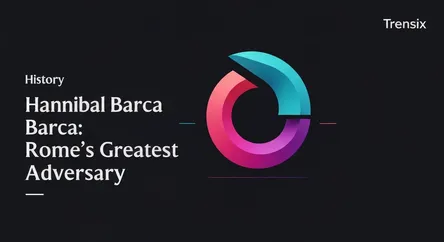History
Hannibal Barca: Rome's Greatest Adversary

An overview of Hannibal Barca, the Carthaginian general who crossed the Alps with elephants to challenge the might of Rome.
What is it?
Hannibal Barca (247 – c. 183 BCE) was a Carthaginian general and statesman widely considered one of history's greatest military commanders. He commanded the forces of Carthage against the Roman Republic during the Second Punic War (218-201 BCE). Sworn to a lifelong hatred of Rome by his father, Hamilcar Barca, Hannibal's campaign was marked by audacity and genius. His most famous feat was marching an army, complete with war elephants, from Iberia across the Pyrenees and the Alps into northern Italy, a move that caught the Romans completely by surprise. He inflicted a series of devastating defeats on the Romans, most notably at the battles of Lake Trasimene and Cannae, where his tactical brilliance nearly shattered Roman power.
Why is it trending?
Hannibal remains a figure of immense historical interest due to his unparalleled strategic mind. His tactics, particularly the double-envelopment maneuver at Cannae, are still studied at military academies worldwide. His story is a timeless epic of a brilliant leader defying a superpower, which continues to be the subject of new books, documentaries, and academic research. Ongoing archaeological investigations and historical debates about the exact route he took across the Alps also keep his legacy in the public consciousness. Hannibal's name is synonymous with daring strategy and relentless determination, making him a perennial icon of military history.
How does it affect people?
Hannibal's legacy profoundly impacts modern military thought and leadership. Called the "father of strategy," his methods have been studied and adapted by military leaders for over two millennia, influencing figures from Napoleon to modern generals. Beyond the military, his story serves as a case study in business and leadership, illustrating the power of innovative thinking, risk-taking, and motivating a diverse team against overwhelming odds. His war against Rome was a defining moment in ancient history; the struggle forced the Roman Republic to innovate its own military and political structures, ultimately contributing to its long-term dominance. He remains a powerful cultural symbol of defiance and strategic genius.